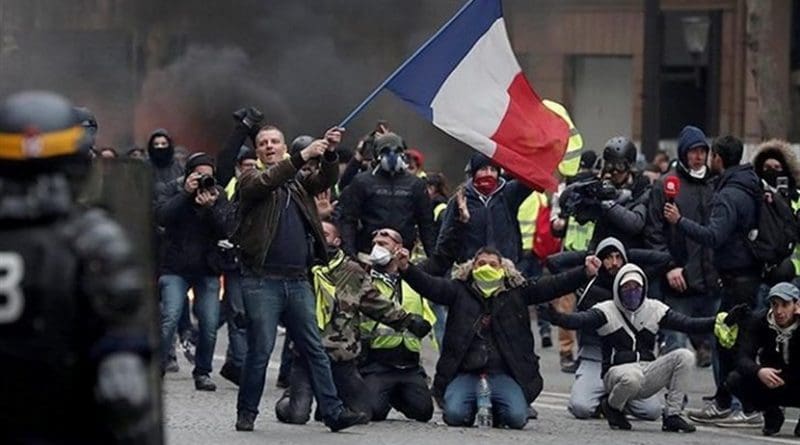Where Will The Yellow Vest ‘Revolution’ End? – OpEd
By Arab News
By Mohamed Chebaro*
Demonstrations, Paris-style, usually involve a few rubbish bins being emptied or burned on a main avenue, possibly a few cars being torched, including a police car or two. Then representatives of labor, transport or other unions meet with government representatives and a compromise is reached, leading the protests to stop. But not this time it seems.
The protesters angry at a rise in fuel prices in an already over-stretched French economy have now turned up the heat on President Emmanuel Macron. The protesters, who seem to have come from across the political and social spectrum thanks to social networking, have turned their anger on the president and the perceived elitism of France’s aloof ruling class.
But just how different is this leaderless protest-turned-revolution, as some have been rushing to call it? It is modern-day, digital, cross-border activism in a complex virtual and material world. The “gilet jaunes,” or yellow vests, are an example of the immediacy and the “now factor” of digital empowerment and the “I can” notion, at the expense of “wait and see what the mayor says” or “what answer would a parliamentary review yield?” It is a manifestation of the new realities fueled by the digital virtual sphere and in a world where the role of the state as we know it is eroding.
This is a new trend in protests, the likes of which the world has never before witnessed. Though violence is condemned, the leaderless, mobile, multi-directional protests are clearly a front for many real social problems that have been neglected by the modern state, not only in France but in every country around the world, poor or rich. Of course such protests could have been mitigated and/or driven by a complex web of deceit working from afar to magnify a disconnect in an already difficult patron-client relationship between the state and its people.
It is like a new epidemic that has fallen from the sky and state institutions have no antidote to face such a threat down. In the last three or four decades, politicians in all countries —democratic, monarchist and dictatorship alike — marginalized equality and the rule of law in favor of collusion between statesmen and the financial sector. This resulted in ballooning greed.
Macron’s retreat and efforts to mend relations with the public are likely to fall on deaf ears, as the entire liberal democratic value system and government model are hanging in the balance in the very capital city that gave the world the modern capitalist but compassionate state at the end of the 18th century.
What began nearly two months ago as an online campaign against high taxes, declining living standards, a self-serving political elite and a president deemed arrogant and out of touch will saddle France and most Western countries with questions that have no easy answers. These include how to modernize without reform, how to prepare for the future and save the environment without raising taxes, and how to create an agile economy with limited compassionate vested interests overseen by a non-colluding political and financial elite that disregards the people and their right to a respectable and safe future.
Away from Europe, the reactions, especially from the Middle East, toward what has been happening in France have been a mixed bag. Some have mainly focused on questions about the role of US President Donald Trump in disrupting the European project, while others weaved a web of deceit and conspiracy theories that alluded to Russian collusion and manipulation of the protests to destabilize the rule of Macron due to his position on Ukraine and role in upholding EU sanctions against Moscow.
But the most lamentable reaction was from Syrian state television, which called on Syrian refugees who had escaped the regime’s onslaught — which left cities destroyed and more than half a million dead — to take care and stay away from flashpoints in Paris and its police brutality.
In the age of fake news, manufactured elections and states meddling in other nations’ internal affairs, all of the above could be plausible and France and its disillusioned citizens could have fallen prey to this scenario or that. But none of the above could begin to answer the question of where these demonstrations are likely to end. Or how to restore confidence in state institutions and politicians, who are the elected representatives of the people and whose task it is to uphold the rule of law and good governance and safeguard the safety and wellbeing of all.
The French state, like many others in the world, desperately needs to realign its income with its expenditure. Its generous social security system model of the 1950s is no longer affordable. Macron’s government, like many others before it, is following economic recommendations to squeeze the ballooning state debts, while managing people’s expectations of continuing to have their needs met. But, just as others have tried and failed, Macron seems no different under the pressure of the yellow vests, who could, rightly or wrongly, inspire others to follow their example in other countries.
*Mohamed Chebaro is a British-Lebanese journalist with more than 25 years’ experience covering war, terrorism, defense, current affairs and diplomacy. He is also a media consultant and trainer.

